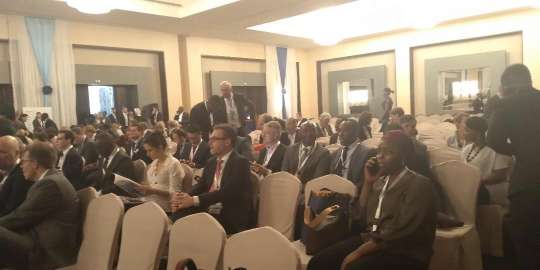The German Government has renewed its pledge to support Africa and Ghana’s economic policies and business to engender stronger economic performance and infrastructural development, particularly, in the areas of health, energy, agriculture and capacity building.
According to them, Africa was a rising market and the Continent for the future, and Germany and Europe at large would continue to strengthen ties with Africa for their mutual benefit.
Dr Gerd Muller, the German Federal Minister for Economic Cooperation and Development, gave the assurance when he addressed business delegations from Germany and African representatives at the opening of the Third German-African Business Summit (GABS), in Accra on Tuesday.
The three-day summit was organised by the Sub-Saharan Africa Initiative of German Business (SAFRI), which attracted more than 750 top businesses and government leaders from Germany and Sub-Saharan Africa.
Read also: Third German-African Business Summit opens in Accra
It is held every two years to discuss and promote economic relations between Europe’s largest economy and the fastest growing region in the world.
Dr Muller gave the assurance that the German government would continue to contribute significantly towards fostering business partnerships between Germany and Africa.
He said Germany had started a new partnership with Africa and viewed the 2063 Africa Sustainable Development Agenda as a laudable initiative, which would champion economic growth on the continent.
For successful economic growth, Dr Muller underscored the need for African nations to process their raw materials locally, strengthen their democratic institutions and promote the rule of law because those tenets were fertile grounds for attracting investments.
Dr Muller announced that in the next three years, Germany would provide vocational training to 25,000 young Ghanaians.
In pursuance of that vision, he said the German government had opened a training centre in Accra to facilitate the training purposes and believed that supporting Africa’s economic growth did not depend solely on investment, but offered training to its future generation as well.
He commended the government of Ghana for making impressive progress on the economic front with one of the highest economic growth in Africa, recording 8.5 per cent growth in 2017, thus, making her one of the 10 fastest growing economies on the continent.
He believed that Ghana was a stable democracy and pillar of peace in the Sub-region and assured of German government’s resolve to support her efforts to succeed.
He said the German government had opened a regional office in Accra to facilitate trade and investment in the sub-region, saying that Ghana was one of the reliable trading partners for Germany.
He gave the assurance that European countries would improve market accessibility for Ghanaian and African products and promised to support manufacturing companies in Ghana and Africa to improve the standards of products for easy accessibility to the European markets.
He said some German companies were interested in investing in cashews, coffee and cocoa, to process them locally to create income and jobs on the continent.
He called for transparent and fair-trade rules between Africa and western nations, since the former lost billions of dollars each year through illicit flows, while huge sums of monies were lost to African governments because international co-operations profit through unfair trade rules.
He noted that increased tax revenues for African governments were the basis for investment in education, health and infrastructural development, saying; “Africa’s future is also the future of Germany and we’ll support you to growâ€.
“I’m convinced that the German-African Business Summit 2019 will be an outstanding opportunity to jointly develop solutions for existing challenges and establish sustainable business ties for the years to come,†Dr Muller added.
He expressed optimism that the conference would send a positive signal of cooperation between policy-makers and business representatives from the two continents.
The Chairman of GABS, Professor Dr. Heinz-Walter GloBe, said the thriving capital city of Ghana provided a perfect setting to deepen business partnerships between Sub-Saharan Africa and Germany.
He observed that, since the last GABS meeting in Kenya, countries in the Sub-Sahara had been dominating the list of the world’s fastest-growing economies and lauded Africa for instituting the Continental Free Trade Agreement Area (CFTA) to promote economic integration.
He said the German government had developed a wide range of policies to support business-driven partnerships to put Africa high on the agenda in Germany, the European Union and within the G-20 context.
“With the German-African Business Summit (SAFRI), a joint initiative of the German-African Business Association (Afrika-Verein), the Association of German Chamber of Commerce and Industry (DHK), the Federation of German Industries (BDI) and the German-Federation of Wholesale and Foreign Trade (BGA), offers a platform for decision-makers from business and politics from Sub-Saharan Africa and Germany to exchange views and experiences, explore business opportunities and to establish or deepen personal contacts.
“I do hope that by doing so, we build robust and successful African-German business platform for joint success,†he stated.
The German government has created an Investment Fund of one billion euros to mitigate the risks for the German companies that invest in Africa and help African small and medium-sized enterprises to grow.
www.primenewsghana.com
Source: GNA
Â
Â





